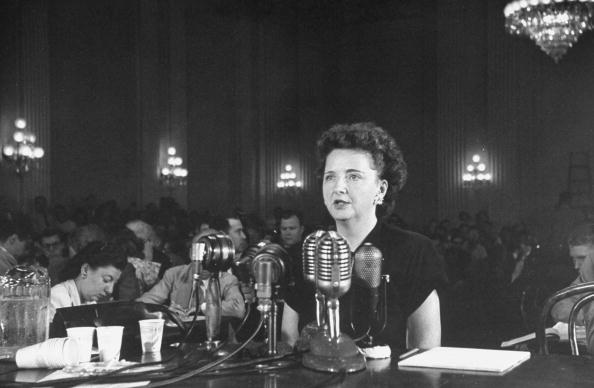Elizabeth Bentley learned the hard way that you never get a second chance to make a first impression.
Introduced to the American public in 1948 as the “blonde spy queen,” the woman of mystery emerged from beneath the weight of newsprint expectations as a not particularly regal brunette on the newsreels. If not exactly homely, Bentley (she looks her best below) appeared at least spinsterish. The media drumroll preceded a wah-wah-wah trombone.

Elizabeth Bentley testifying at microphones at hearing on Communism. (Photo by Thomas D. Mcavoy/The LIFE Picture Collection/Getty Images)
Reality Winner looks like everything the media sold Elizabeth Bentley as. She intuitively knows this (without knowing Elizabeth Bentley) and seeks to use it to her advantage.
“I’m going to play that card being pretty, white, and cute, braid my hair and cry and all,” Winner informed her sister about her legal strategy over the jailhouse phone. Big Brother, upset that she shared his written words, shared her spoken ones.
For whatever reason, the media appears apprehensive to run with Winner’s “pretty, white, and cute” narrative. Their Fourth Estate forebears did so even when the subject fit just one of the three adjectives.
When presented with a milquetoast, middle-aged Frumpelstiltskin in Elizabeth Bentley, the media invented a sexy spy from central casting that couldn’t help but indirectly undermine the witness’s credibility once the public glimpsed her face. Reality Winner appears as the “blonde spy queen” (albeit one involved in leaking rather than espionage) the media talked about in 1948. But they don’t talk about the strangely-named woman or show her photogenic visage much. Her existence complicates the narrative. So, while the intelligence apparatus didn’t disappear her as she worried, the Fourth Estate has.
The made-for-television leaker got quickly cancelled. She validated administration concerns that people working within the intelligence apparatus actively work to undermine the president. CNN, on air and on its website, makes efforts to ignore her existence and the major networks, as noted by this FoxNews.com article, expressed ignorance of her motives despite a plethora of social media posts spelling them out in 140 characters or less.
Her twitter account resembled the colorful car bumpers that ostensibly advertise this cause and that issue but really announce the automobile owner’s mental illness. She refers to the president as an orange, a tangerine, and perhaps other less delicious produce. She tweeted that “being white is terrorism,” for her followers to “pray for the Arctic,” to condemn “animal farming,” and that “#TrumpIsAC—.” How did a person who retweeted an Edward Snowden observation receive a security clearance?
While the media built up Elizabeth Bentley only to cruelly cut her down, journalists imagine away Reality Winner. The strangely different treatment contrasts with similarities between the interesting intergenerational odd couple.
Both women used aliases. Bentley’s American contacts knew her as “Helen”; the Russians code-named her “Clever Girl.” Reality Winner took “Sara Winners” as her nom de tweet. Bentley mastered Italian, learned French, and picked up some Russian; Winner speaks Pashto, Farsi, and Dari. They both belonged to cults: Communism in Bentley’s case, CrossFit in Winner’s. Bentley joined the League for Industrial Democracy, the American League Against War and Fascism, and, ultimately, the Communist Party. Winner supported Black Lives Matter, sported a Sierra Club bumpersticker on her Nissan, and a Daily Kos post dubbed her one its “Heroes of the #Resistance” because she used that hashtag. Russia, for very different reasons, motivated their efforts to share America’s secrets.
But Bentley, in contrast to Winner, did something positive with her life. She told all about her days as a domestic subversive and, in the words of biographer Lauren Kessler, “named eighty-seven American citizens, from prominent party functionaries to prominent government officials, from sympathizers and fellow travelers to dues-paying comrades, from people she knew personally to those she had only heard about from others. The list was longer still if one counted Russians and other foreign nationals—more than a hundred names.” More so than the more famous Whittaker Chambers, Elizabeth Bentley rooted Communists out of the American government in the late 1940s.
There’s beauty in redemption. There’s ugliness in clinging to looks to excuse behavior.
Reality Winner only appears on to a winning strategy in counting on people to judge her appearance over her reality. Try to find twelve jurors who uniformly embrace her “pretty, white, and cute” defense. I did, and failed miserably—even though I, like Reality Winner, find Reality Winner “pretty, white, and cute.” My verdict that a judge should find Reality Winner not guilty by reason of hotness left others to find me not guilty by reason of insanity. I insisted she looked like a blonde Maggie Gyllenhaal; a correspondent noted that she resembled someone with fetal-alcohol syndrome who bore the physiognomy of one who wiped from back to front. Another, perhaps threatened that she can bench press 170 twice and he can’t, noted her “jacked” appearance (like it’s a bad thing!). Whatever. If they prefer Chelsea Manning as their spying sex symbol, it’s 2017 and that’s their personal business. The point? One man’s blonde spy queen is two other dudes’ swipe-left minger.
The packaging only helps the product so much. Bentley’s contemporary Whittaker Chambers hit Americans as a fat, shoe-gazing, wrinkle-bomb of a man with horrible teeth. The svelte, handsome, Harvard-educated Alger Hiss initially left a much better impression. The first impression aided some in proclaiming the latter man’s innocence. But the evidence eventually won the day.
Pretty, white, and cute can usually get you on TV. But it can’t, in this instance, get Reality Winner far from the penitentiary.


COMMENTS
Please let us know if you're having issues with commenting.